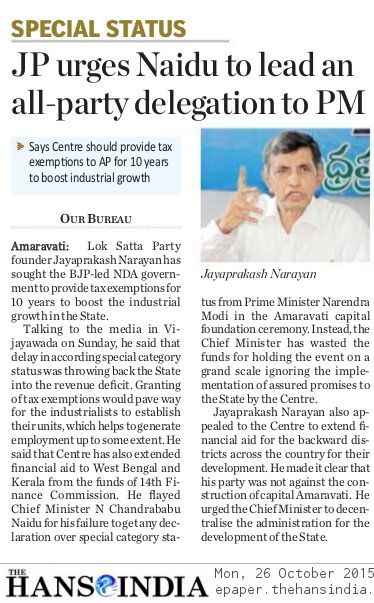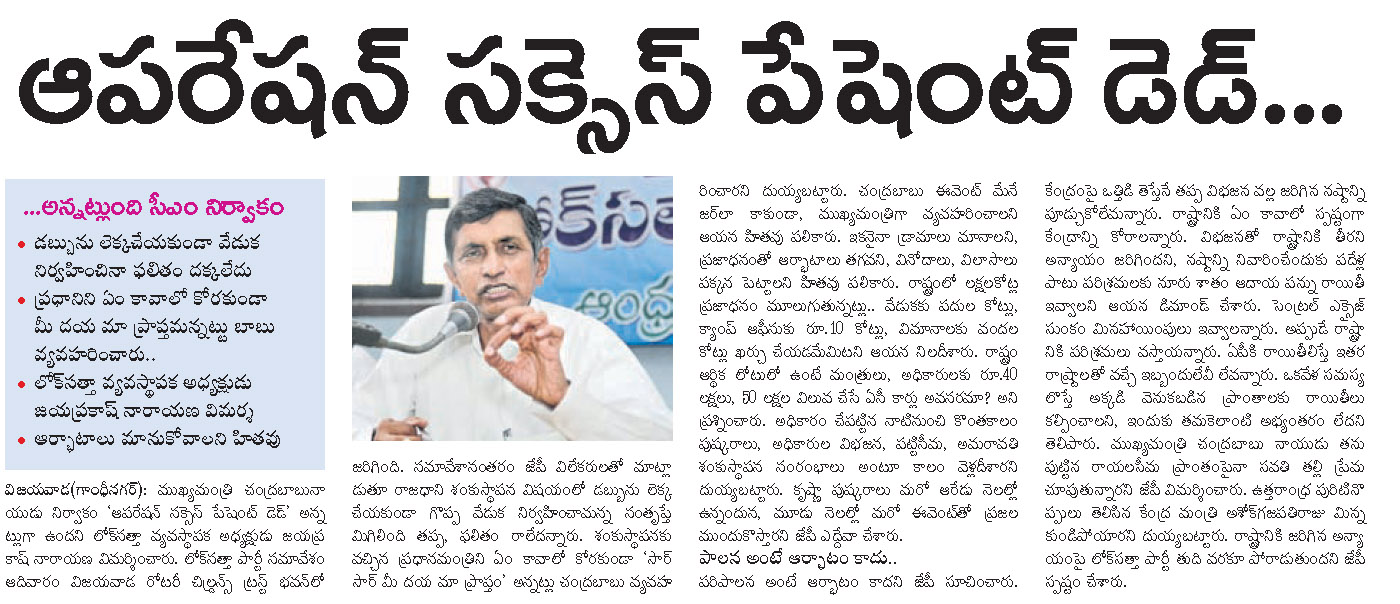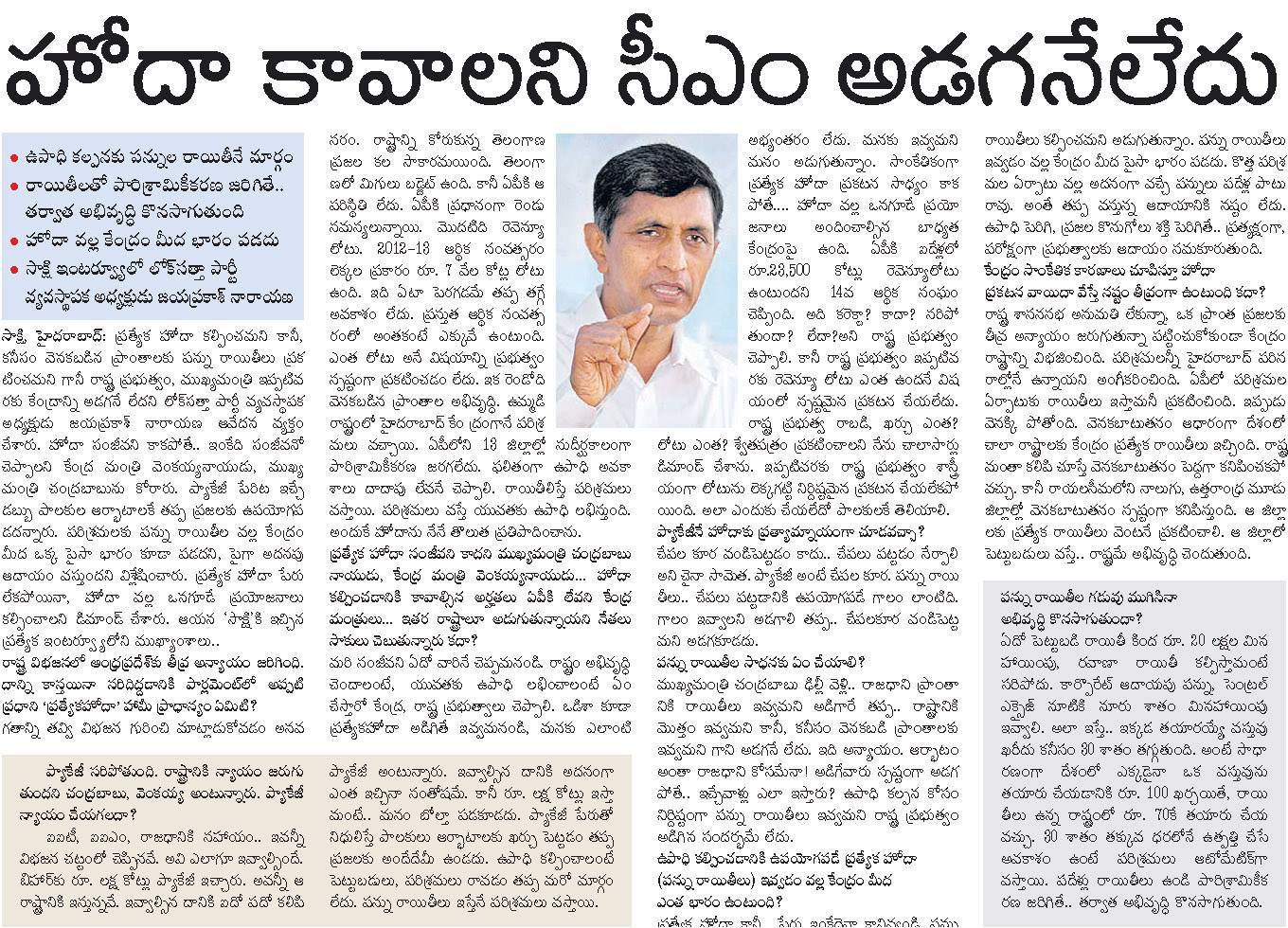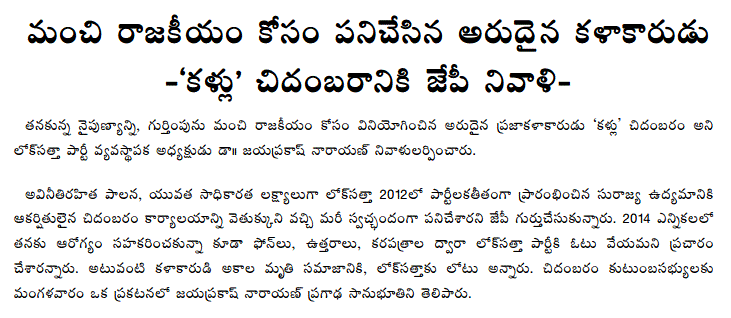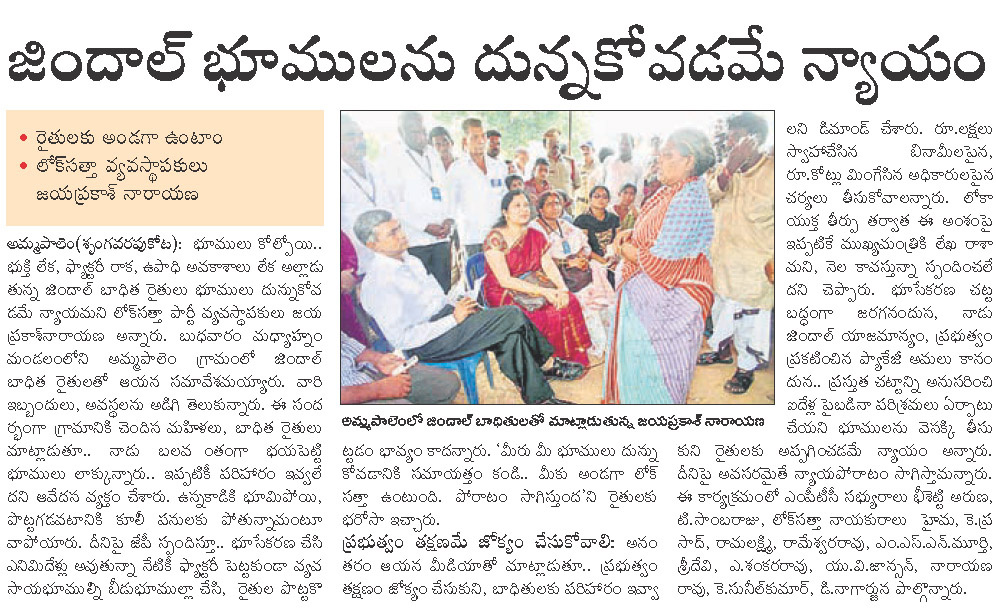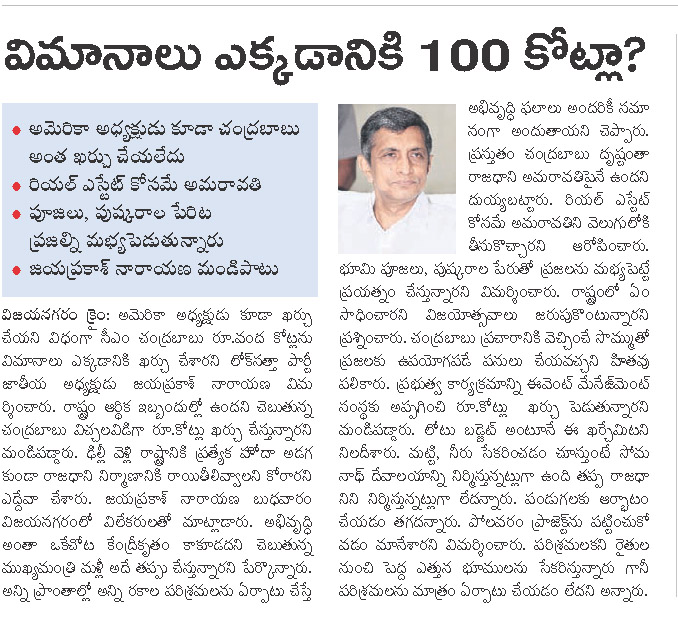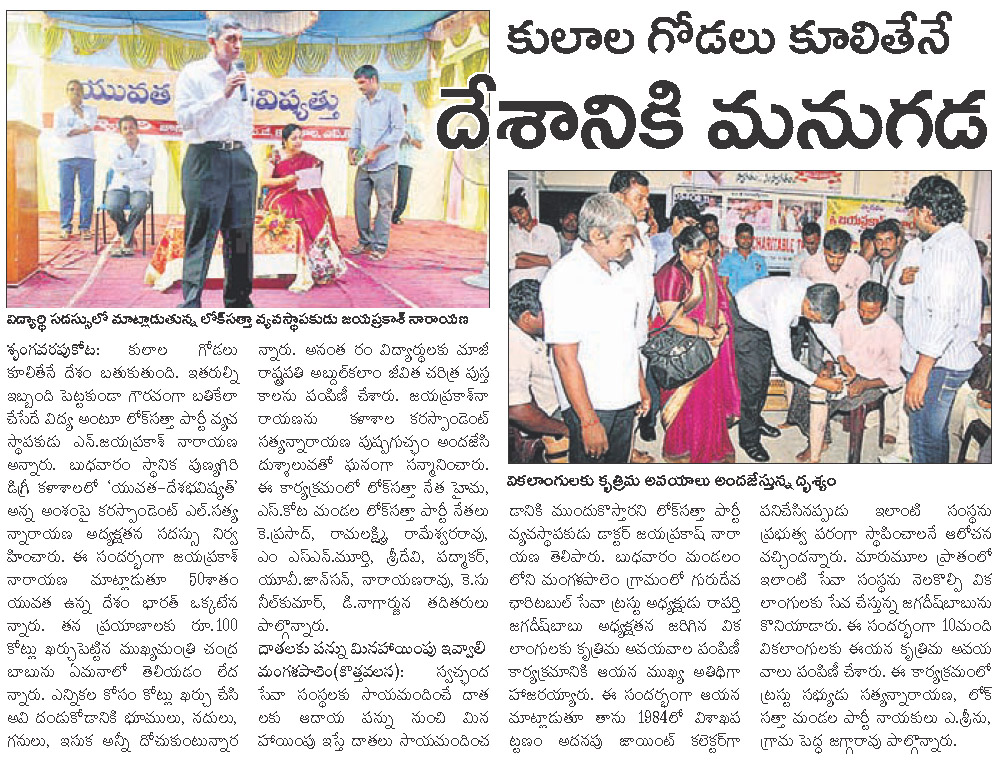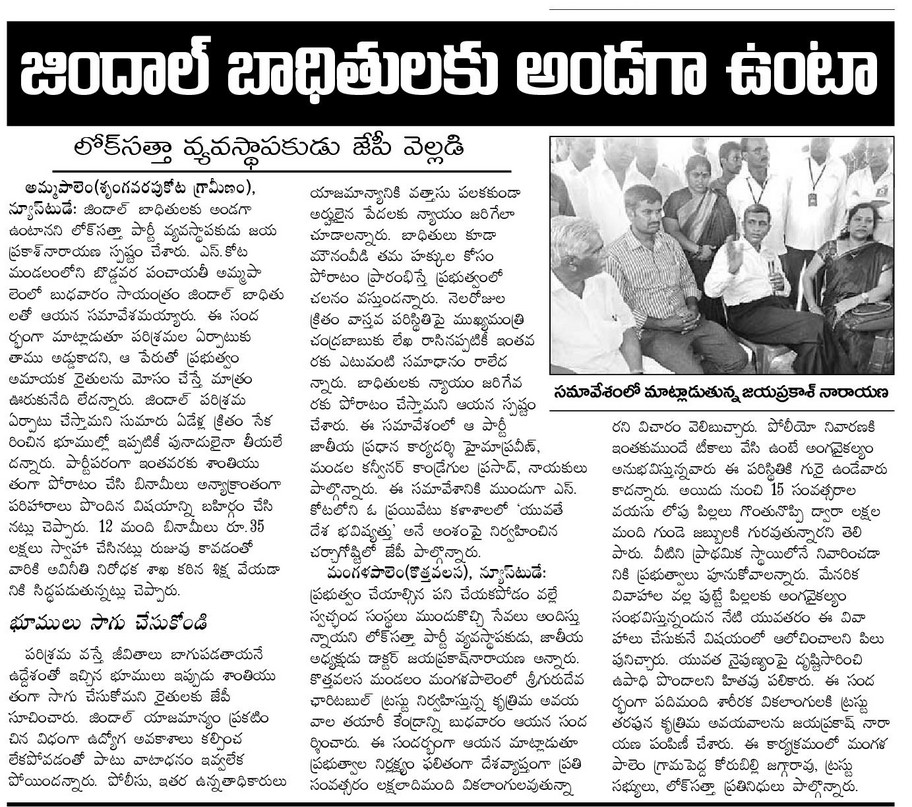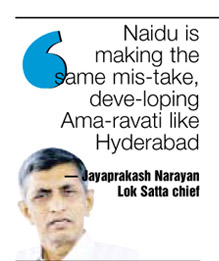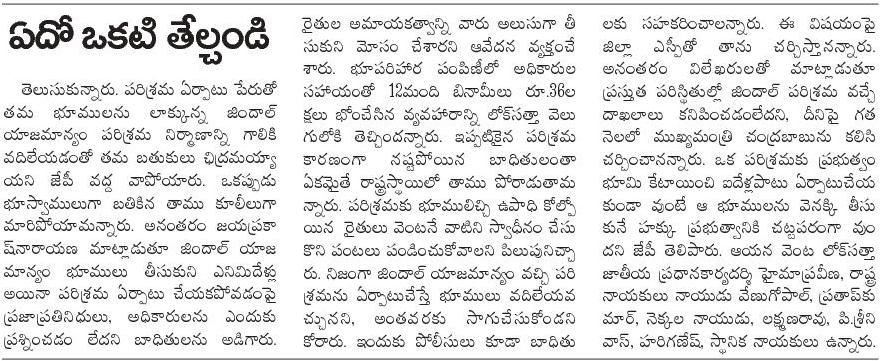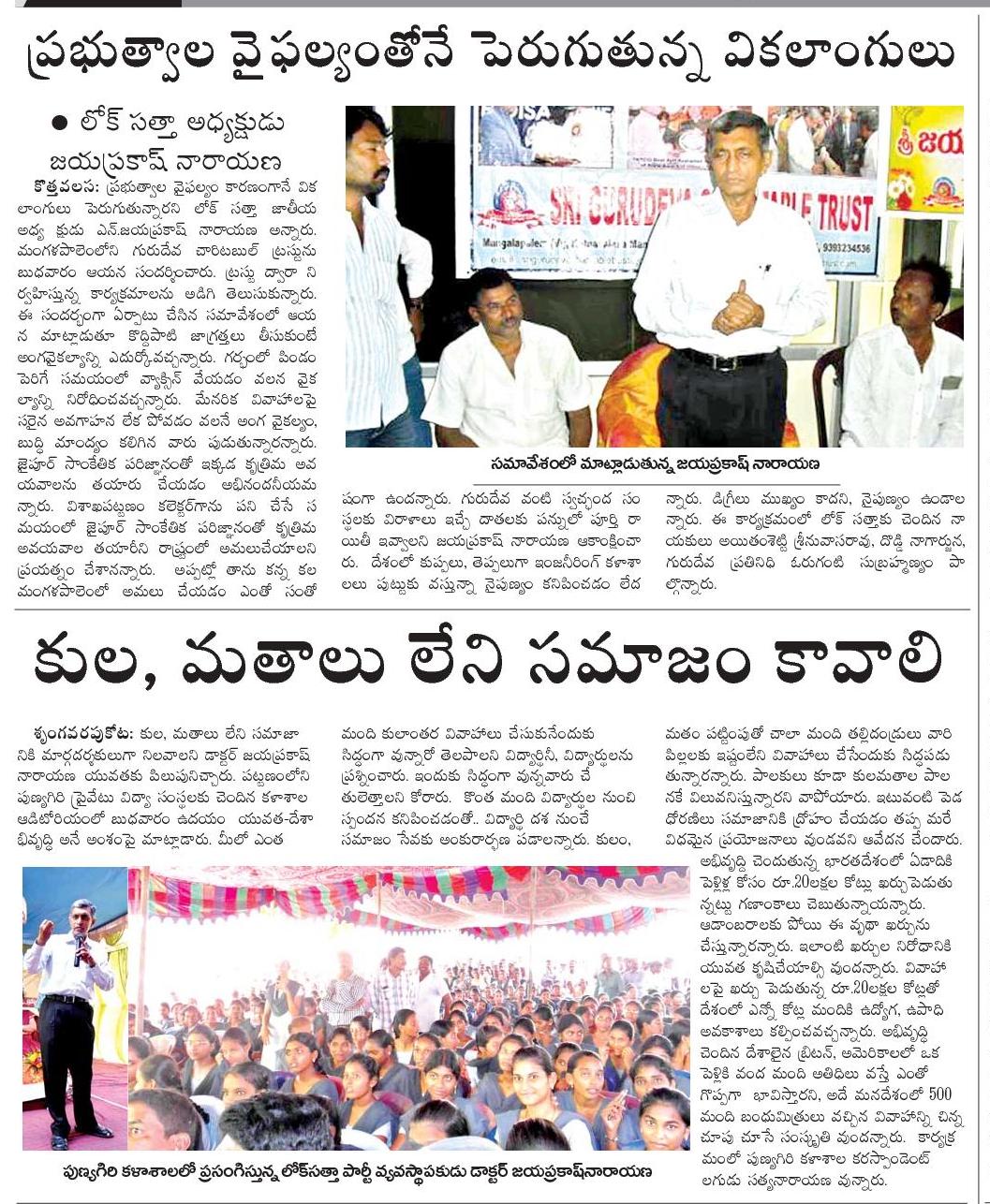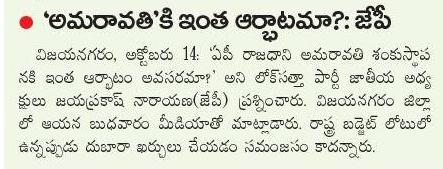Tuesday, October 27, 2015
Sunday, October 25, 2015
ప్రముఖుల అనుభవాలను ఈ తరానికి అందించాలి
Labels:
AndhraJyothy,
telugu
Saturday, October 24, 2015
Friday, October 23, 2015
Wednesday, October 21, 2015
Tuesday, October 20, 2015
An Organ Appointing Itself, Believing It Has a Monopoly On All Wisdom And Virtue, Is Permanent Priesthood
Dr Nagabhairava Jaya Prakash Narayana, founder of the Lokstatta NGO and founding president of the party, general secretary of the Foundation for Democratic Reforms and eminent thinker, is disturbed by the Supreme Court’s rejection of the National Judicial Appointments Commission. Surajit Dasgupta, National Affairs Editor of Swarajya, interviews him.
Surajit Dasgupta: First of all, this issue of appointment of judges, the case going to the supreme court, and the people about whom the appointment is, they are themselves adjudicating it! Doesn’t this amount to conflict of interest?
N Jaya Prakash Narayana: You have raised an important question, Surajit. I wouldn’t say this is conflict of interest to the extent that the court cannot adjudicate. Then it becomes impossible; somebody has to adjudicate. But the fact is that the Supreme Court judges are interested parties in the appointment process and, therefore, tremendous judicial restraint is called for. I’m afraid that restraint that was so necessary in a mature institution seems to not have been exercised. To that extent, I agree with you.
But at the end of the day, if the constitutionality of any law is in question, you have to have an adjudicating body and that has to be the Supreme Court. I do not quarrel with that. But institutions must act with great maturity with an understanding of their constitutional limitations and also with a deep sense of balance that is required among various organs of (the) State. It is expected that the Supreme Court would ordinarily exercise that kind of a caution, ensure that kind of balance. In this case it appears that perhaps that balance has been absent.
SD: Where exactly do you think it failed to exercise restraint? On which particular provision?
JN: What is the court’s mandate in a matter like this? This is not an ordinary law or an executive action that is subject to judicial review. The only mandate for the court is — is it (the NJAC) constitutionally valid or not?
Now, what are the two constitutional injunctions? Injunction One — that the judiciary must be independent. There cannot be two opinions on that. The Supreme Court wants it; the lay public want it; the governments and the political parties are wise — they want it. There is not one person in the country who would go against it. Because even political parties, at some time or the other, have seen what it means to be targets of executive action that is arbitrary. Therefore, there is no serious minded Indian who would not want the court to be independent. That is non-negotiable. So they have to measure whether this particular process is affecting the independence.
The second is, is the process constitutionally valid? It is not for the courts to say whether this is a better procedure or something else is a better procedure. That’s a matter of judgement. That is a matter of appreciation of what is better. It’s a qualitative assessment. That’s not the court’s job — not only on this issue, but on any issue. Now, if that is the case, in the absence of a law about the mechanism for consultation, the Supreme Court in 1993 and ’98 had given those decisions. They themselves are questionable. It asserts the jurisdiction. But still, in the absence of a law or specific constitutional prescription, it is perhaps understandable — a bit similar to the Election Commission’s powers when there is no law in respect of code of conduct etc. But when there is an explicit constitutional amendment — and in this context, Parliament becomes the Constituent Assembly — and there is not a whiff of interference in judicial functioning, but there is a wide consultation involving the legislature, the executive and the lay public in an appropriate manner, in a prescribed manner, in appointing the judiciary, you cannot say that in itself is violative of independence of the judiciary.
The world over — we are not the only democracy — there are scores of democracies with a lot of experience in this with independent judiciary, fiercely independent judiciary, in no country does the judiciary appoint itself. It is an absurd proposition to say that the representatives of Parliament or the government are part of the process of selection, it vitiates the selection. It is absurd because (a) every institution derives its legitimacy in a democracy directly or indirectly from the people — directly, the elected legislatures in governments; indirectly, everything else. And if you completely delink anything from the elected government in terms of its creation, not in terms of its functioning—these are two different things — then there is a serious problem of democratic legitimacy. You are creating an organ which is now beyond democratic accountability, an organ that says it will appoint itself! In effect, it is a permanent priesthood. A democracy does not envisage that.
If we extend this logic, then the Election Commission, the Public Service Commissions, the CAG, the CVC — though not a constitutional authority, expected to be impartial and independent — the Lokpal/Lokayuktas, the nascent organisations and institutions, each one of these would also appoint themselves because they are expected to be independent! So this is an absurd logic.
There is nothing unconstitutional about the process of constitutional amendment or the content of it. So it’s more a subjective assessment of what in their judgement, the court’s judgement, is desirable. And that’s not what the court’s duty is.
SD: Mr Ram Jethmalani reacted to this verdict of yesterday by saying that the government wanted to change our judiciary to the one like in Pakistan or Sri Lanka.
JN: I don’t know much about the Pakistani judiciary except from a distance. Sri Lanka—I’ve heard about how Mr Jayawardene tried to control the judiciary. It is extremely far-fetched and completely without evidence to make this kind of an allegation.
Because, unlike what happened in the 1970s, when for no good reasons — actually for the reason that they were fiercely independent — (Justice KS) Hegde, (Justice JM) Shelat and (Justice AN) Grover were all superseded. I as a young Indian — our generation of young people at that time — I remember that very vividly, how The Indian Express had banner headlines about three senior-most judges being superseded. And subsequently during Emergency due to the habeas corpus case, (Shivakant) Shukla versus ADM-Jabalpur, and Justice HR Khanna, because he had the courage to take the right call against the majority view, was again superseded. So, we all know that. This is not some such thing; this is merely a process where the elected government or Parliament has a rightful role in the deliberative process. Period! No more, no less!
In any case, if for instance somebody particularly odious is sought to be appointed, this amendment said that any two members of this six-member commission could veto it. There are three judges and everybody — the National Commission to review the working of the Constitution, the Law Commission, the committee of eminent jurists like of Justice MN Venkatachaliah, (Justice the late) JS Verma and (Justice the late) VR Krishna Iyer constituted by the Foundation for Democratic Reforms (FDR), Lok Satta — they all said that the appointment must be by consensus.
In other words, you cannot say that so-and-so must be appointed, but you can say so-and-so cannot be appointed for valid reasons. And only if everybody agrees, yes, so-and-so deserves to be appointed shall that person be appointed. You can’t go merely by majority.
SD: It should be unanimous.
JN: The idea is, unless the person is acceptable — the record, the integrity, the credibility are beyond reproach.
SD: The appointments must be aboveboard.
JN: Exactly! Because, alright, the majority says ‘yes’ but some people have grave reservations — it’s not right. For instance, if you recall, earlier under the UPA government when the CVC was appointed, the then opposition leader in the Lok Sabha, she (Sushma Swaraj) raised valid objections.
SD: She gave a note of dissent.
JN: Yeah! Because there were cases pending, some allegations pending… so on and so forth. They were brushed aside, these allegations, by a majority. Because the Prime Minister and the Home Minister had a majority, they appointed the person (PJ Thomas). The Supreme Court rightly rejected it. Merely because you have a majority in a committee like this, but there are valid objections, you cannot overrule it. Same principle here!
So, it’s not really forcing anybody to be appointed; it is actually denying appointment where there is no consensus. Obviously, without valid reasons, there is no expectation that they would raise an objection for objection’s sake. And high functionaries in the country are not expected to do anything in an arbitrary manner. If it does become that, there’s nothing wrong in the Supreme Court making it even public that this kind of a thing is being done; so the public opinion asserts itself. In a democracy, you have to have balance, you have to have checks. No institution must arrogate to itself the power not granted to it by the Constitution.
First the Supreme Court says that the process of consultation goes beyond consultation; it is consent of the Supreme Court. Then it says that its recommendation is binding. Then it says any other mechanism is unconstitutional. Now you’ve created a permanent priesthood!
There is a larger principle involved.
SD: This NJAC had the sanction of both the Lok Sabha and the Rajya Sabha. But yesterday, the Congress distanced itself from the past consensus saying that this judgment reflects the fact that the judiciary does not trust this particular government.
JN: When FDR worked on this for the past 10-12-14 years, we kept the leaders of the then UPA and the NDA informed — in particular Dr Manmohan Singh, the successive law ministers, every law minister without exception, Mrs Sonia Gandhi and the opposition at that time — Mr LK Advani, Mr Arun Jaitley etc — at every stage. And the committee of eminent jurists deliberating, the product of the deliberations, the background papers — everything was shared with the government and opposition at every stage.
It was the UPA that had actually initiated the process. The NDA improved upon that because the Leader of the Opposition could mean that there is no official opposition in the Lok Sabha if the opposition does not have 10% plus strength in the House. The NDA quite rightly said “leader of the largest (opposition) party” so that if it is the Congress or some other party, it will have space. Unanimously, Parliament in both Houses — that means the Congress included — voted for it. The only dissenter was Ram Jethmalani who actually abstained, if I recall correctly.
On behalf of FDR, I had written to all parties, leaders and Members of Parliament well before this judgment seeking their understanding on this and, in the event of the Supreme Court, taking the decision perhaps creates an imbalance between the organs of the State. This is the right issue where all parties must bury their political differences, rise above partisan politics and look for a solution that protects independence of the judiciary and the constitutional scheme of things.
I have a letter here from Mrs Sonia Gandhi dated 23 September 2015.
SD: May I have a copy of it?
JN: Yes. I’ll read it for you.
It may be recalled that the NJAC Bill was initiated during the UPA regime. The Congress Party supported the passage of the Bill in Parliament and the NJAC Act has been notified by the Government in April 2015. We continue to support the NJAC.
This is three weeks ago. The sadness of partisan politics is, what you believe is right for the country and what you feel is expedient for your political or partisan interest at a point of time—there seems to be a great divergence between the two often. This is one such case.
SD: It’s hypocritical?
JN: Well, I would not use that word. This is politics (sniggers)!
It is one of the problems. See, nobody holds a brief for our political culture in India today. It is pretty murky, unhappy. Many prominent politicians themselves have privately and publicly remarked about what is wrong with the political process—the money power in elections, the corruption, abuse of authority, wrong kind of people getting in, criminalisation of politics…
SD: And Parliament not functioning!
JN: Yes, centralisation of power, no public discourse of any quality, Parliament being paralysed… all kinds of things we all know.
Because in Parliament or in other legislatures there is so much of cynicism and so much of reckless abuse of each other, disregarding facts and public interest, it has become easy for other organs or institutions of the State to debunk the political process itself, the democratic process itself, and arrogate to themselves the powers not granted under the Constitution. It is this climate of revulsion of politics that made it easier for the Supreme Court to give an order of this kind.
In any democratic society, it would be unthinkable that any organ of the State would arrogate to itself this kind of power completely negating the democratic process and the will of the people.
SD: So you believe this climate played a role in the making of this judgment?
JN: There is no doubt whatsoever. If there is a perception that there is dignified debate in Parliament, politics is conducted in a civilised manner, and that Parliament would stand above partisan politics on fundamental issues, then the whole approach will be different altogether.
SD: But now that this stand has been taken by the Congress, the government seems to be wary of taking it back to Parliament, taking all parties together and then sending it back to the court with a renewed mandate from Parliament.
JN: Even if all parties are united on this, the government is right in being wary. It has to be very careful. Whatever be the difficulties and shortcomings, we must recognise that the Supreme Court is a moral institution, the judiciary is a moral institution. When the chips are down; you and I approach the court to get relief when the State is acting in an arbitrary manner, in a corrupt manner or a tyrannical manner, we have no other recourse but the courts of law. Therefore, whatever we do must not undermine the court’s credibility and its authority or independence. It must not be seen as a confrontation ever.
But at the same time, it is important to restore the balance in the interest of the court itself. Because if slowly the perception spreads that… today it may appear that the court won a victory, but certainly there are many thoughtful Indians, non-partisan Indians, who care for the rule of law and judicial independence, who are deeply troubled about the institutional implications of this verdict. To that extent, the credibility of the court is dented. And over time, this will only get worse.
In the recent years we have heard so much about some of the judges not being able to conform to the standards we expect of them in terms of probity, in terms of competence, in terms of impartiality, in terms of constitutional understanding etc.
SD: So, restoring the faith of the people in the judiciary is of prime importance?
JN: Exactly! And sustaining that faith because, ultimately, India is still in the infancy as a democracy. Therefore, there are very visceral issues in a diverse country issues like reservations, mandir-masjid, inter-state disputes, river water problems, it is very easy to mobilise people on a large scale with these primordial loyalties. And that’s what politicians and political parties do all over the world and here as well. Therefore, there may not always be political solutions. What is constitutionally right and where a balance is needed between the rights of an individual versus those of a group, the rights of all citizens, it can only be established by the Supreme Court. The court’s credibility is of paramount importance in moments like that.
The moment the Babri Masjid-Ram Janmabhoomi case went to the Allahabad High Court and then the Supreme Court, the whole country forgot about the dispute, have you realised? Nobody bothered about even the merits of the case and what the judgment is. I don’t think anybody seriously considered that. The fact that there is an impartial, independent body, with the credibility of examining the issue, they said, ‘whatever the court decide, we will agree!’ There was a broad consensus across the country. That’s exactly what we need — that faith in the Supreme Court. The moment that faith in some respect is eroded because a perception is spread that the Supreme Court is usurping the jurisdiction that is not its own, it is dangerous for the country in the long term and to the court’s authority itself.
It’s not enough that today you somehow get your way. It’s much more important that your moral authority is accepted by everybody rather than your danda (stick). ‘I’ll give an order and let’s see what happens’ is, for the time being, being followed because there is no other alternative. There’s a difference between the two — winning obedience, winning respect and credibility versus ‘alright, they have given an order; I don’t like it, but what do I do?’ that kind of a thing. In that sense, it has long-term implications.
SD: When the government gave examples of advanced and functional democracies, like the United States, the United Kingdom, Germany etc, the court observed that India was still not mature enough to emulate those examples. Do you agree with that?
JN: That’s an absurd argument in any situation in any country. The British said Indians were not mature enough to get independence. Many argued we were not mature enough to get universal adult franchise. So, basically that the people of India are not free, not ready to be free, or not ready to govern themselves, is a nonsensical argument. That’s true for every country.
You mature only by exercising the power, committing mistakes if need be and with proper institutional checks and balances. Everybody knows that our politics is messy, but there are correctives — they (politicians) have to go back to the people. Every day they are facing abuse and ridicule in Parliament and outside. There are demonstrations, morchas (picketing), protests, so on and so forth. And, of course, the media is absolutely vocal in criticising them. And the court acts as the referee and ensures that they don’t violate the constitutional boundaries. In any case, they are accountable to Parliament. So, there are checks.
But what is the check on the court? If a Supreme Court judge or a High Court judge acts arbitrarily, nefariously, or with partisan intent, what is the recourse?
SD: Impeachment?
JN: Impeachment has failed in this country. Unlike in the US where several federal judges have been removed, in India there is not a single instance. Even when there were just reasons!
Mr Shanti Bhushan gave a list of judges to the Supreme Court — and these were very eminent judges including chief justices — whose integrity was in question, the court could not even answer back. Those who are in the know of the judiciary, they all know about such shady things. But we don’t want to make it public because we don’t undermine the judiciary. It will help the country since the judiciary as such is a moral institution. But to think that all wisdom and virtue is a monopoly of a particular institution or individual is nothing but permanent priesthood.
We are all human institutions, and every human institution is fallible. No individual is indispensable or infallible. The courts seem to think that they are indispensable and infallible — both; everybody else is both dispensable and fallible! That’s perhaps not how a democracy functions.
SD: So, what is the way forward you see, or what is the process you would prescribe or advice to the government?
JN: I don’t know if there is an easy answer to this from anybody, least of all from me because this is unprecedented. If the Supreme Court had exercised some restraint, anticipating that it is a potential for confrontation, if not today then one day, between the legislature and the judiciary, it would have been better. But now that it did not happen, I think at all costs we must avoid both actual confrontation and the appearance of a confrontation.
At the same time, this cannot go without even a serious debate, honest debate as to what the best way to protect our judiciary is, ensure its independence and guarantee that the finest jurists in terms of ability, integrity, competence and non-partisanship become the judges. In that sense of a national debate, this Supreme Court verdict is not the last word. It cannot be.
Whatever flaws the Supreme Court has pointed out in the various judgments yesterday, to the extent that they are rectifiable, to the extent that they are reasonable, an earnest effort should be made to rectify them.
Because the collegiums system — it is an informal collegiums system, please understand; there is no formal procedure prescribed — could pretty much be ‘you scratch my back and I’ll scratch yours’. It is not a formally codified, legally sanctified system. We do require a legally sanctified system that is satisfactory to everybody — to the country, the legislature and the judiciary. I hope that process will be underway; it will take some time, but I don’t think there should be a knee-jerk reaction. Because, whatever we do, we must not undermine the independence of the judiciary. We must not create a confrontation or an impression of a confrontation; it’s not good for anybody.
SD: But as of now, this collegiums system, with all its flaws, stays till there is another solution proposed and then it is accepted by the Supreme Court.
JN: It’s a grey area now. The collegiums system has obviously been restored by the judgment. But the Supreme Court has itself acknowledged that the collegiums system is flawed. Therefore, they said, they will start hearing from the next month onwards about the improvements required in the collegiums system. So somewhere we must find an acceptable via media.
If this becomes a turf war, either Parliament or the Supreme Court makes it a matter of prestige that would be a sad thing because nobody is above the nation and the Constitution. Now that all issues have been raised before the public, I hope that there is a serious debate in Parliament. It cannot wish away this debate. Parliament must honestly examine how to set things right and what the best courses are. They must consult not only the members of the existing judiciary but also the former judges, jurists and eminent Indians.
Equally important, as we discussed earlier, is the fact that all this has arisen because of a climate created by lack of trust in the political process in general and revulsion of politics in the country, particularly among the middle classes. Politicians and political parties would do well to honestly introspect and see how best to improve the institutional mechanisms to bring the best into politics, to improve the quality of discourse and decision making and to enhance the credibility.
Courtesy: Swarajyamag.com
Surajit Dasgupta: First of all, this issue of appointment of judges, the case going to the supreme court, and the people about whom the appointment is, they are themselves adjudicating it! Doesn’t this amount to conflict of interest?
N Jaya Prakash Narayana: You have raised an important question, Surajit. I wouldn’t say this is conflict of interest to the extent that the court cannot adjudicate. Then it becomes impossible; somebody has to adjudicate. But the fact is that the Supreme Court judges are interested parties in the appointment process and, therefore, tremendous judicial restraint is called for. I’m afraid that restraint that was so necessary in a mature institution seems to not have been exercised. To that extent, I agree with you.
But at the end of the day, if the constitutionality of any law is in question, you have to have an adjudicating body and that has to be the Supreme Court. I do not quarrel with that. But institutions must act with great maturity with an understanding of their constitutional limitations and also with a deep sense of balance that is required among various organs of (the) State. It is expected that the Supreme Court would ordinarily exercise that kind of a caution, ensure that kind of balance. In this case it appears that perhaps that balance has been absent.
SD: Where exactly do you think it failed to exercise restraint? On which particular provision?
JN: What is the court’s mandate in a matter like this? This is not an ordinary law or an executive action that is subject to judicial review. The only mandate for the court is — is it (the NJAC) constitutionally valid or not?
Now, what are the two constitutional injunctions? Injunction One — that the judiciary must be independent. There cannot be two opinions on that. The Supreme Court wants it; the lay public want it; the governments and the political parties are wise — they want it. There is not one person in the country who would go against it. Because even political parties, at some time or the other, have seen what it means to be targets of executive action that is arbitrary. Therefore, there is no serious minded Indian who would not want the court to be independent. That is non-negotiable. So they have to measure whether this particular process is affecting the independence.
The second is, is the process constitutionally valid? It is not for the courts to say whether this is a better procedure or something else is a better procedure. That’s a matter of judgement. That is a matter of appreciation of what is better. It’s a qualitative assessment. That’s not the court’s job — not only on this issue, but on any issue. Now, if that is the case, in the absence of a law about the mechanism for consultation, the Supreme Court in 1993 and ’98 had given those decisions. They themselves are questionable. It asserts the jurisdiction. But still, in the absence of a law or specific constitutional prescription, it is perhaps understandable — a bit similar to the Election Commission’s powers when there is no law in respect of code of conduct etc. But when there is an explicit constitutional amendment — and in this context, Parliament becomes the Constituent Assembly — and there is not a whiff of interference in judicial functioning, but there is a wide consultation involving the legislature, the executive and the lay public in an appropriate manner, in a prescribed manner, in appointing the judiciary, you cannot say that in itself is violative of independence of the judiciary.
The world over — we are not the only democracy — there are scores of democracies with a lot of experience in this with independent judiciary, fiercely independent judiciary, in no country does the judiciary appoint itself. It is an absurd proposition to say that the representatives of Parliament or the government are part of the process of selection, it vitiates the selection. It is absurd because (a) every institution derives its legitimacy in a democracy directly or indirectly from the people — directly, the elected legislatures in governments; indirectly, everything else. And if you completely delink anything from the elected government in terms of its creation, not in terms of its functioning—these are two different things — then there is a serious problem of democratic legitimacy. You are creating an organ which is now beyond democratic accountability, an organ that says it will appoint itself! In effect, it is a permanent priesthood. A democracy does not envisage that.
If we extend this logic, then the Election Commission, the Public Service Commissions, the CAG, the CVC — though not a constitutional authority, expected to be impartial and independent — the Lokpal/Lokayuktas, the nascent organisations and institutions, each one of these would also appoint themselves because they are expected to be independent! So this is an absurd logic.
There is nothing unconstitutional about the process of constitutional amendment or the content of it. So it’s more a subjective assessment of what in their judgement, the court’s judgement, is desirable. And that’s not what the court’s duty is.
SD: Mr Ram Jethmalani reacted to this verdict of yesterday by saying that the government wanted to change our judiciary to the one like in Pakistan or Sri Lanka.
JN: I don’t know much about the Pakistani judiciary except from a distance. Sri Lanka—I’ve heard about how Mr Jayawardene tried to control the judiciary. It is extremely far-fetched and completely without evidence to make this kind of an allegation.
Because, unlike what happened in the 1970s, when for no good reasons — actually for the reason that they were fiercely independent — (Justice KS) Hegde, (Justice JM) Shelat and (Justice AN) Grover were all superseded. I as a young Indian — our generation of young people at that time — I remember that very vividly, how The Indian Express had banner headlines about three senior-most judges being superseded. And subsequently during Emergency due to the habeas corpus case, (Shivakant) Shukla versus ADM-Jabalpur, and Justice HR Khanna, because he had the courage to take the right call against the majority view, was again superseded. So, we all know that. This is not some such thing; this is merely a process where the elected government or Parliament has a rightful role in the deliberative process. Period! No more, no less!
In any case, if for instance somebody particularly odious is sought to be appointed, this amendment said that any two members of this six-member commission could veto it. There are three judges and everybody — the National Commission to review the working of the Constitution, the Law Commission, the committee of eminent jurists like of Justice MN Venkatachaliah, (Justice the late) JS Verma and (Justice the late) VR Krishna Iyer constituted by the Foundation for Democratic Reforms (FDR), Lok Satta — they all said that the appointment must be by consensus.
In other words, you cannot say that so-and-so must be appointed, but you can say so-and-so cannot be appointed for valid reasons. And only if everybody agrees, yes, so-and-so deserves to be appointed shall that person be appointed. You can’t go merely by majority.
SD: It should be unanimous.
JN: The idea is, unless the person is acceptable — the record, the integrity, the credibility are beyond reproach.
SD: The appointments must be aboveboard.
JN: Exactly! Because, alright, the majority says ‘yes’ but some people have grave reservations — it’s not right. For instance, if you recall, earlier under the UPA government when the CVC was appointed, the then opposition leader in the Lok Sabha, she (Sushma Swaraj) raised valid objections.
SD: She gave a note of dissent.
JN: Yeah! Because there were cases pending, some allegations pending… so on and so forth. They were brushed aside, these allegations, by a majority. Because the Prime Minister and the Home Minister had a majority, they appointed the person (PJ Thomas). The Supreme Court rightly rejected it. Merely because you have a majority in a committee like this, but there are valid objections, you cannot overrule it. Same principle here!
So, it’s not really forcing anybody to be appointed; it is actually denying appointment where there is no consensus. Obviously, without valid reasons, there is no expectation that they would raise an objection for objection’s sake. And high functionaries in the country are not expected to do anything in an arbitrary manner. If it does become that, there’s nothing wrong in the Supreme Court making it even public that this kind of a thing is being done; so the public opinion asserts itself. In a democracy, you have to have balance, you have to have checks. No institution must arrogate to itself the power not granted to it by the Constitution.
First the Supreme Court says that the process of consultation goes beyond consultation; it is consent of the Supreme Court. Then it says that its recommendation is binding. Then it says any other mechanism is unconstitutional. Now you’ve created a permanent priesthood!
There is a larger principle involved.
SD: This NJAC had the sanction of both the Lok Sabha and the Rajya Sabha. But yesterday, the Congress distanced itself from the past consensus saying that this judgment reflects the fact that the judiciary does not trust this particular government.
JN: When FDR worked on this for the past 10-12-14 years, we kept the leaders of the then UPA and the NDA informed — in particular Dr Manmohan Singh, the successive law ministers, every law minister without exception, Mrs Sonia Gandhi and the opposition at that time — Mr LK Advani, Mr Arun Jaitley etc — at every stage. And the committee of eminent jurists deliberating, the product of the deliberations, the background papers — everything was shared with the government and opposition at every stage.
It was the UPA that had actually initiated the process. The NDA improved upon that because the Leader of the Opposition could mean that there is no official opposition in the Lok Sabha if the opposition does not have 10% plus strength in the House. The NDA quite rightly said “leader of the largest (opposition) party” so that if it is the Congress or some other party, it will have space. Unanimously, Parliament in both Houses — that means the Congress included — voted for it. The only dissenter was Ram Jethmalani who actually abstained, if I recall correctly.
On behalf of FDR, I had written to all parties, leaders and Members of Parliament well before this judgment seeking their understanding on this and, in the event of the Supreme Court, taking the decision perhaps creates an imbalance between the organs of the State. This is the right issue where all parties must bury their political differences, rise above partisan politics and look for a solution that protects independence of the judiciary and the constitutional scheme of things.
I have a letter here from Mrs Sonia Gandhi dated 23 September 2015.
SD: May I have a copy of it?
JN: Yes. I’ll read it for you.
It may be recalled that the NJAC Bill was initiated during the UPA regime. The Congress Party supported the passage of the Bill in Parliament and the NJAC Act has been notified by the Government in April 2015. We continue to support the NJAC.
This is three weeks ago. The sadness of partisan politics is, what you believe is right for the country and what you feel is expedient for your political or partisan interest at a point of time—there seems to be a great divergence between the two often. This is one such case.
SD: It’s hypocritical?
JN: Well, I would not use that word. This is politics (sniggers)!
It is one of the problems. See, nobody holds a brief for our political culture in India today. It is pretty murky, unhappy. Many prominent politicians themselves have privately and publicly remarked about what is wrong with the political process—the money power in elections, the corruption, abuse of authority, wrong kind of people getting in, criminalisation of politics…
SD: And Parliament not functioning!
JN: Yes, centralisation of power, no public discourse of any quality, Parliament being paralysed… all kinds of things we all know.
Because in Parliament or in other legislatures there is so much of cynicism and so much of reckless abuse of each other, disregarding facts and public interest, it has become easy for other organs or institutions of the State to debunk the political process itself, the democratic process itself, and arrogate to themselves the powers not granted under the Constitution. It is this climate of revulsion of politics that made it easier for the Supreme Court to give an order of this kind.
In any democratic society, it would be unthinkable that any organ of the State would arrogate to itself this kind of power completely negating the democratic process and the will of the people.
SD: So you believe this climate played a role in the making of this judgment?
JN: There is no doubt whatsoever. If there is a perception that there is dignified debate in Parliament, politics is conducted in a civilised manner, and that Parliament would stand above partisan politics on fundamental issues, then the whole approach will be different altogether.
SD: But now that this stand has been taken by the Congress, the government seems to be wary of taking it back to Parliament, taking all parties together and then sending it back to the court with a renewed mandate from Parliament.
JN: Even if all parties are united on this, the government is right in being wary. It has to be very careful. Whatever be the difficulties and shortcomings, we must recognise that the Supreme Court is a moral institution, the judiciary is a moral institution. When the chips are down; you and I approach the court to get relief when the State is acting in an arbitrary manner, in a corrupt manner or a tyrannical manner, we have no other recourse but the courts of law. Therefore, whatever we do must not undermine the court’s credibility and its authority or independence. It must not be seen as a confrontation ever.
But at the same time, it is important to restore the balance in the interest of the court itself. Because if slowly the perception spreads that… today it may appear that the court won a victory, but certainly there are many thoughtful Indians, non-partisan Indians, who care for the rule of law and judicial independence, who are deeply troubled about the institutional implications of this verdict. To that extent, the credibility of the court is dented. And over time, this will only get worse.
In the recent years we have heard so much about some of the judges not being able to conform to the standards we expect of them in terms of probity, in terms of competence, in terms of impartiality, in terms of constitutional understanding etc.
SD: So, restoring the faith of the people in the judiciary is of prime importance?
JN: Exactly! And sustaining that faith because, ultimately, India is still in the infancy as a democracy. Therefore, there are very visceral issues in a diverse country issues like reservations, mandir-masjid, inter-state disputes, river water problems, it is very easy to mobilise people on a large scale with these primordial loyalties. And that’s what politicians and political parties do all over the world and here as well. Therefore, there may not always be political solutions. What is constitutionally right and where a balance is needed between the rights of an individual versus those of a group, the rights of all citizens, it can only be established by the Supreme Court. The court’s credibility is of paramount importance in moments like that.
The moment the Babri Masjid-Ram Janmabhoomi case went to the Allahabad High Court and then the Supreme Court, the whole country forgot about the dispute, have you realised? Nobody bothered about even the merits of the case and what the judgment is. I don’t think anybody seriously considered that. The fact that there is an impartial, independent body, with the credibility of examining the issue, they said, ‘whatever the court decide, we will agree!’ There was a broad consensus across the country. That’s exactly what we need — that faith in the Supreme Court. The moment that faith in some respect is eroded because a perception is spread that the Supreme Court is usurping the jurisdiction that is not its own, it is dangerous for the country in the long term and to the court’s authority itself.
It’s not enough that today you somehow get your way. It’s much more important that your moral authority is accepted by everybody rather than your danda (stick). ‘I’ll give an order and let’s see what happens’ is, for the time being, being followed because there is no other alternative. There’s a difference between the two — winning obedience, winning respect and credibility versus ‘alright, they have given an order; I don’t like it, but what do I do?’ that kind of a thing. In that sense, it has long-term implications.
SD: When the government gave examples of advanced and functional democracies, like the United States, the United Kingdom, Germany etc, the court observed that India was still not mature enough to emulate those examples. Do you agree with that?
JN: That’s an absurd argument in any situation in any country. The British said Indians were not mature enough to get independence. Many argued we were not mature enough to get universal adult franchise. So, basically that the people of India are not free, not ready to be free, or not ready to govern themselves, is a nonsensical argument. That’s true for every country.
You mature only by exercising the power, committing mistakes if need be and with proper institutional checks and balances. Everybody knows that our politics is messy, but there are correctives — they (politicians) have to go back to the people. Every day they are facing abuse and ridicule in Parliament and outside. There are demonstrations, morchas (picketing), protests, so on and so forth. And, of course, the media is absolutely vocal in criticising them. And the court acts as the referee and ensures that they don’t violate the constitutional boundaries. In any case, they are accountable to Parliament. So, there are checks.
But what is the check on the court? If a Supreme Court judge or a High Court judge acts arbitrarily, nefariously, or with partisan intent, what is the recourse?
SD: Impeachment?
JN: Impeachment has failed in this country. Unlike in the US where several federal judges have been removed, in India there is not a single instance. Even when there were just reasons!
Mr Shanti Bhushan gave a list of judges to the Supreme Court — and these were very eminent judges including chief justices — whose integrity was in question, the court could not even answer back. Those who are in the know of the judiciary, they all know about such shady things. But we don’t want to make it public because we don’t undermine the judiciary. It will help the country since the judiciary as such is a moral institution. But to think that all wisdom and virtue is a monopoly of a particular institution or individual is nothing but permanent priesthood.
We are all human institutions, and every human institution is fallible. No individual is indispensable or infallible. The courts seem to think that they are indispensable and infallible — both; everybody else is both dispensable and fallible! That’s perhaps not how a democracy functions.
SD: So, what is the way forward you see, or what is the process you would prescribe or advice to the government?
JN: I don’t know if there is an easy answer to this from anybody, least of all from me because this is unprecedented. If the Supreme Court had exercised some restraint, anticipating that it is a potential for confrontation, if not today then one day, between the legislature and the judiciary, it would have been better. But now that it did not happen, I think at all costs we must avoid both actual confrontation and the appearance of a confrontation.
At the same time, this cannot go without even a serious debate, honest debate as to what the best way to protect our judiciary is, ensure its independence and guarantee that the finest jurists in terms of ability, integrity, competence and non-partisanship become the judges. In that sense of a national debate, this Supreme Court verdict is not the last word. It cannot be.
Whatever flaws the Supreme Court has pointed out in the various judgments yesterday, to the extent that they are rectifiable, to the extent that they are reasonable, an earnest effort should be made to rectify them.
Because the collegiums system — it is an informal collegiums system, please understand; there is no formal procedure prescribed — could pretty much be ‘you scratch my back and I’ll scratch yours’. It is not a formally codified, legally sanctified system. We do require a legally sanctified system that is satisfactory to everybody — to the country, the legislature and the judiciary. I hope that process will be underway; it will take some time, but I don’t think there should be a knee-jerk reaction. Because, whatever we do, we must not undermine the independence of the judiciary. We must not create a confrontation or an impression of a confrontation; it’s not good for anybody.
SD: But as of now, this collegiums system, with all its flaws, stays till there is another solution proposed and then it is accepted by the Supreme Court.
JN: It’s a grey area now. The collegiums system has obviously been restored by the judgment. But the Supreme Court has itself acknowledged that the collegiums system is flawed. Therefore, they said, they will start hearing from the next month onwards about the improvements required in the collegiums system. So somewhere we must find an acceptable via media.
If this becomes a turf war, either Parliament or the Supreme Court makes it a matter of prestige that would be a sad thing because nobody is above the nation and the Constitution. Now that all issues have been raised before the public, I hope that there is a serious debate in Parliament. It cannot wish away this debate. Parliament must honestly examine how to set things right and what the best courses are. They must consult not only the members of the existing judiciary but also the former judges, jurists and eminent Indians.
Equally important, as we discussed earlier, is the fact that all this has arisen because of a climate created by lack of trust in the political process in general and revulsion of politics in the country, particularly among the middle classes. Politicians and political parties would do well to honestly introspect and see how best to improve the institutional mechanisms to bring the best into politics, to improve the quality of discourse and decision making and to enhance the credibility.
Courtesy: Swarajyamag.com
Labels:
english
Monday, October 19, 2015
Lok Satta Times Oct 16th-31st, 2015
Lok Satta Times Oct 16th-31st, 2015 can be downloaded from the following link.
http://ap.loksatta.org/documents/lstimes/lstimes-2015-10-16-31.pdf
http://ap.loksatta.org/documents/lstimes/lstimes-2015-10-16-31.pdf
Friday, October 16, 2015
Dr. JP wants Parliament to undo SC verdict On judicial appointments
Terming the Supreme Court verdict striking down the National Judicial Appointments Commission (NJAC) Act as hasty and patently unconstitutional, Loksatta founder Dr. Jayaprakash Narayan today demanded that an emergency session of Parliament be convened immediately so that it can assert its supremacy in determining the procedure for judicial appointments.
Addressing a media conference, Dr. JP recalled that Parliament had enacted the Constitution 99th Amendment providing for the NJAC to recommend appointments and transfers in higher judiciary as the Supreme Court by judicial pronouncements had usurped the power to recommend appointments through a collegium of judges.
The Foundation for Democratic Reforms (FDR) and Lok Satta have for long argued that appointment of judges by collegiums of judges is antithetical to democracy and accountability. At the instance of the FDR/Lok Satta, three eminent jurists of unimpeachable integrity (Justice MN Venkatachaliah and (late) Justice JS Verma, both former Chief Justices of India, and (late) Justice VR Krishna Iyer, former Judge of Supreme Court) had studied the system and recommended constitution of a National Judicial Commission (NJC) for recommending judicial appointments. The NJAC proposed by the Government is on the lines of the NJC recommended by the three jurists.
Fearing the repercussions of quashing the 99th Amendment, Dr. JP in a September 15 letter to the Prime Minister, the Leader of the Opposition and all MPs had said that if the 99th amendment is quashed by the court, it will be a fit case for Parliament to stand its ground and assert its supremacy in determining the procedure for judicial appointments.
Dr. JP said there are three compelling reasons why judicial appointments cannot be the sole preserve of the judiciary.
First, no organ can appoint itself in a democracy. The SC cannot be a self-appointed permanent priesthood. "Independence of judiciary does not mean judges are independent of the Constitution. By SC's logic, Election Commission, Comptroller and Auditor General, Union Public Service Commission, Central Vigilance Commission, Lokpal, - all must appoint their own successors to preserve their independence." Every state functionary must derive legitimacy from people directly or indirectly. Second, in all democracies judges are appointed by government and legislature with participation of lay citizens. In the US, the UK, Canada, Germany, France and other democracies where government is the biggest litigant, judges are not appointed by judges. "It is universally accepted that democracy and justice are too important to be left to judges alone."
Third, it is important to protect the credibility of the higher judiciary. If the Court’s credibility is eroded because of usurpation of powers not granted under the Constitution, it will hurt the court, the Constitution and democracy. Only a credible and respected Supreme Court can safeguard the Constitution and the nation in a highly polarized society with a propensity to visceral reactions based on primordial loyalties of caste, religion, region and language. The frequent agitations for and against reservations in education and public employment, highly emotive issues like the Babri Masjid-Ram Janmabhoomi dispute, river water sharing, and other highly contentious disputes in a complex and diverse society need to be resolved away from partisan politics, and in the cold light of logic, Constitution and the law.
Dr JP urged that the Parliament should meet in an emergency session and debate threadbare the mechanism for judicial appointments. The issue must be beyond parties and petty politics. Mrs Sonia Gandhi already wrote to FDR on Sept 23 pledging continued support of Congress party to NJAC. The media, civil society leaders and eminent citizens must come together to resolve the issue peacefully in keeping with democratic norms, judicial independence, constitutionalism and political consensus.
Dr. JP said the Supreme Court verdict also underlined the need to cleanse politics and not to revile and reject it. "We all love to hate politicians. But the answer to dirty politics is not divine institutions; it lies in political reform. Political parties abusing and opposing each other recklessly has led to a culture of revulsion of politics. This climate has led to today’s SC verdict."
Addressing a media conference, Dr. JP recalled that Parliament had enacted the Constitution 99th Amendment providing for the NJAC to recommend appointments and transfers in higher judiciary as the Supreme Court by judicial pronouncements had usurped the power to recommend appointments through a collegium of judges.
The Foundation for Democratic Reforms (FDR) and Lok Satta have for long argued that appointment of judges by collegiums of judges is antithetical to democracy and accountability. At the instance of the FDR/Lok Satta, three eminent jurists of unimpeachable integrity (Justice MN Venkatachaliah and (late) Justice JS Verma, both former Chief Justices of India, and (late) Justice VR Krishna Iyer, former Judge of Supreme Court) had studied the system and recommended constitution of a National Judicial Commission (NJC) for recommending judicial appointments. The NJAC proposed by the Government is on the lines of the NJC recommended by the three jurists.
Fearing the repercussions of quashing the 99th Amendment, Dr. JP in a September 15 letter to the Prime Minister, the Leader of the Opposition and all MPs had said that if the 99th amendment is quashed by the court, it will be a fit case for Parliament to stand its ground and assert its supremacy in determining the procedure for judicial appointments.
Dr. JP said there are three compelling reasons why judicial appointments cannot be the sole preserve of the judiciary.
First, no organ can appoint itself in a democracy. The SC cannot be a self-appointed permanent priesthood. "Independence of judiciary does not mean judges are independent of the Constitution. By SC's logic, Election Commission, Comptroller and Auditor General, Union Public Service Commission, Central Vigilance Commission, Lokpal, - all must appoint their own successors to preserve their independence." Every state functionary must derive legitimacy from people directly or indirectly. Second, in all democracies judges are appointed by government and legislature with participation of lay citizens. In the US, the UK, Canada, Germany, France and other democracies where government is the biggest litigant, judges are not appointed by judges. "It is universally accepted that democracy and justice are too important to be left to judges alone."
Third, it is important to protect the credibility of the higher judiciary. If the Court’s credibility is eroded because of usurpation of powers not granted under the Constitution, it will hurt the court, the Constitution and democracy. Only a credible and respected Supreme Court can safeguard the Constitution and the nation in a highly polarized society with a propensity to visceral reactions based on primordial loyalties of caste, religion, region and language. The frequent agitations for and against reservations in education and public employment, highly emotive issues like the Babri Masjid-Ram Janmabhoomi dispute, river water sharing, and other highly contentious disputes in a complex and diverse society need to be resolved away from partisan politics, and in the cold light of logic, Constitution and the law.
Dr JP urged that the Parliament should meet in an emergency session and debate threadbare the mechanism for judicial appointments. The issue must be beyond parties and petty politics. Mrs Sonia Gandhi already wrote to FDR on Sept 23 pledging continued support of Congress party to NJAC. The media, civil society leaders and eminent citizens must come together to resolve the issue peacefully in keeping with democratic norms, judicial independence, constitutionalism and political consensus.
Dr. JP said the Supreme Court verdict also underlined the need to cleanse politics and not to revile and reject it. "We all love to hate politicians. But the answer to dirty politics is not divine institutions; it lies in political reform. Political parties abusing and opposing each other recklessly has led to a culture of revulsion of politics. This climate has led to today’s SC verdict."
Thursday, October 15, 2015
'అమరావతి'కి ఇంత ఆర్భాటమా?: జేపీ
Labels:
AndhraJyothy,
telugu
'జిందాల్' బాధితులకు లోక్ సత్తా అండ
Labels:
AndhraBhoomi,
telugu
విద్యావ్యవస్థలో మార్పు రావాలి
Labels:
AndhraBhoomi,
telugu
Tuesday, October 13, 2015
Monday, October 12, 2015
Saturday, October 10, 2015
Friday, October 9, 2015
Friday, October 2, 2015
Lok Satta Times Oct 1st-15th, 2015
Lok Satta Times Oct 1st-15th, 2015 can be downloaded from the following link.
http://ap.loksatta.org/documents/lstimes/lstimes-2015-10-01-15.pdf
http://ap.loksatta.org/documents/lstimes/lstimes-2015-10-01-15.pdf
Thursday, October 1, 2015
Subscribe to:
Posts (Atom)


